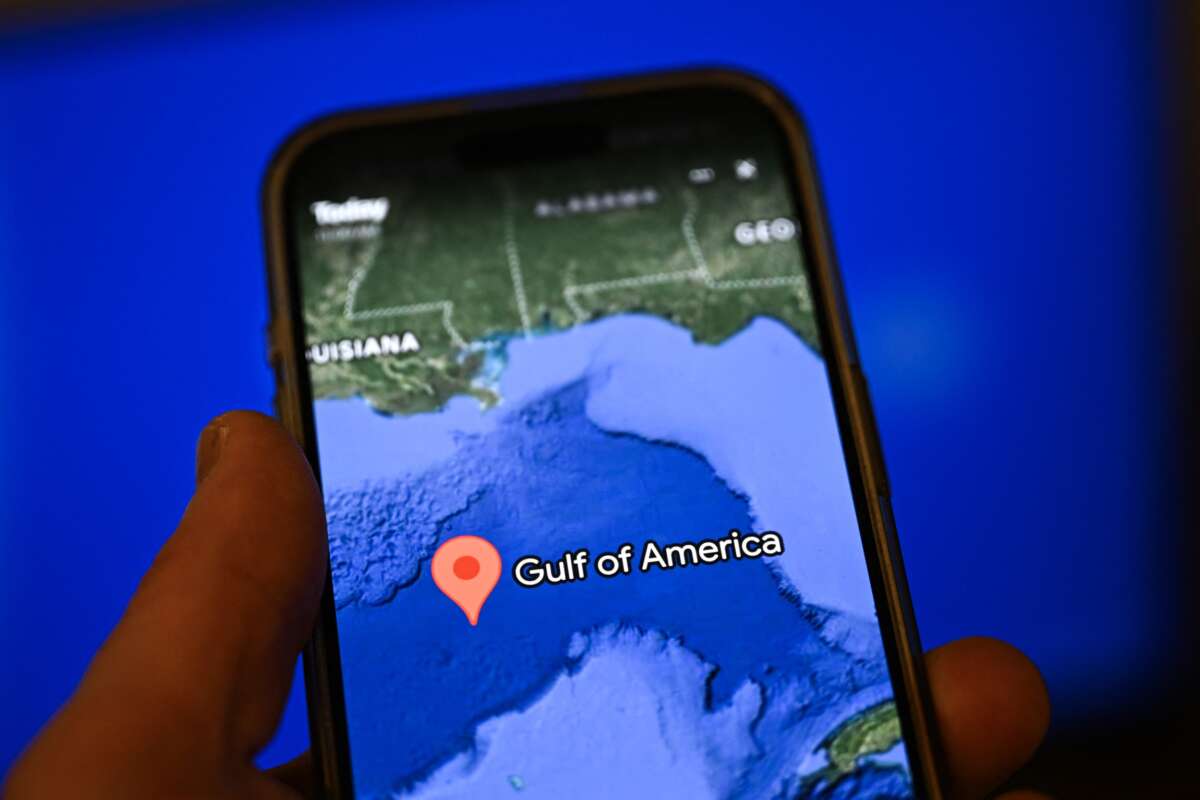Support justice-driven, accurate and transparent news — make a quick donation to Truthout today!
Google Maps has officially changed the name of the Gulf of Mexico to the “Gulf of America” for U.S. users of the app following an executive action by President Donald Trump.
Trump signed an executive order to enact the name change on his first day in office, claiming he made the decision because the gulf “has long been an integral asset to our once burgeoning Nation and has remained an indelible part of America.”
Trump’s order was finalized this week when the Geographic Names Information System (GNIS) made the switch, changing the gulf’s name throughout the federal government.
The move is deeply unpopular among American voters. According to a Data for Progress poll conducted last month, a majority of Americans (55 percent) oppose the name change, while only 24 percent support it.
In a blog post this week, Google explained that its maps display the official names of geographic locations within the country users are viewing them from. The change would only apply to people living in the U.S. or viewing the maps from there, Google said.
“The names you see in the Maps app are based on your country location, which is determined by information from your phone’s operating system,” the blog post explained, adding that the names “are based on the region you select in your Search settings or your device’s location.”
In the U.S., the gulf will be displayed as the “Gulf of America.” In Mexico, it will remain the “Gulf of Mexico.” From anywhere else in the world, the body of water will be labeled as “Gulf of Mexico (Gulf of America).”
Although the change is consistent with the Google Maps policy on names for geographic locations elsewhere, the move comes as Google has made numerous attempts to endear itself to Trump over the past several weeks.
The company, for example, gave $1 million to Trump’s inauguration fund. It also opted to end its diversity hiring targets following Trump’s executive order terminating diversity, equity and inclusion (DEI) programs and funding across the federal government. And along with the changes to its maps this week, Google removed Black History Month and Pride Month from its list of annual celebrations on Google Calendar.
Google also announced earlier this month that it would abandon its Responsible AI pledge, which included a promise not to use artificial intelligence to develop tech that could cause “overall harm” — including weapons and surveillance systems.
In a blog post explaining the change, senior officers for the company wrote that in “an increasingly complex geopolitical landscape… democracies should lead in AI development, guided by core values like freedom, equality, and respect for human rights,” and that “companies, governments, and organizations sharing these values should work together to create AI that protects people, promotes global growth, and supports national security.”
Many observers condemned the company’s removal of its pledge to prevent AI from being used to develop technology that is utilized to commit human rights violations.
“It’s deeply concerning to see Google drop its commitment to the ethical use of AI technology without input from its employees or the broader public,” Parul Koul, a Google software engineer and president of the Alphabet Union Workers-CWA, told Wired.
Former Google AI ethical team lead Margaret Mitchell said that the move “means Google will probably now work on deploying technology directly that can kill people.”
Speaking against the authoritarian crackdown
In the midst of a nationwide attack on civil liberties, Truthout urgently needs your help.
Journalism is a critical tool in the fight against Trump and his extremist agenda. The right wing knows this — that’s why they’ve taken over many legacy media publications.
But we won’t let truth be replaced by propaganda. As the Trump administration works to silence dissent, please support nonprofit independent journalism. Truthout is almost entirely funded by individual giving, so a one-time or monthly donation goes a long way. Click below to sustain our work.
